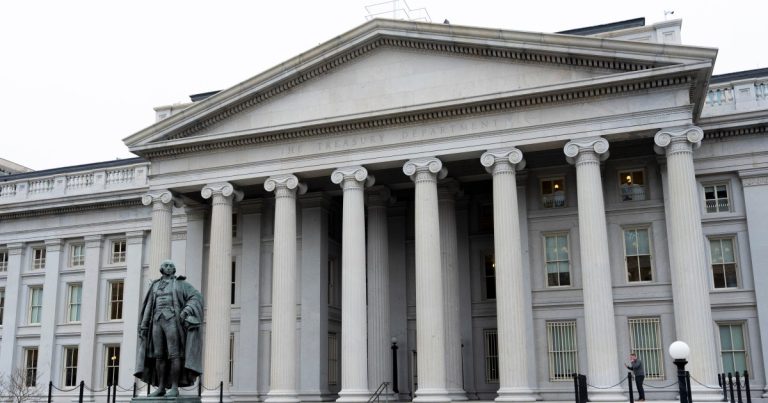United States President Donald Trump’s tariffs have roiled financial markets globally.
But while Trump’s trade salvoes have sent stock markets on a rollercoaster ride, it is the turmoil in the bond markets – specifically the fall of bonds in tandem with stocks – that has prompted the most concern among economists.
What are bonds?
Bonds are a type of investment that involves the buyer lending money to a government or corporation for a specified period.
In return for their investment, the buyer receives interest payments at a specified rate at regular intervals, in addition to the original investment sum upon the maturity of the bond at a predetermined date.
While typically providing lower returns than stocks, government bonds are widely considered among the most low-risk investment options.
Bonds issued by the US Treasury are especially favoured by investors as a safe haven asset since they have the backing of the world’s most powerful government and top economy.
Because of their reputation as a safe asset during periods of economic volatility, the prices of Treasuries – which are known as “bills”, “notes” or “bonds”, based on their maturity date – typically rise as the prices of stocks fall.
The prices and yields of Treasury bonds move in opposite directions – the cheaper the bond, the higher the interest payment.
What has been happening in the bond market?
After Trump announced sweeping tariffs on dozens of US trading partners on April 2, investors began selling off longer-maturity US Treasuries in large quantities, sending yields sharply higher.
The sell-off came in spite of huge losses in the US stock market, bucking the usual pattern of investors rushing to assets typically deemed to be safe havens.
At its peak on Friday, the yield on the 10-year Treasury rose to 4.58 percent, compared with less than 3.9 percent a week previously.
The sell-off in Treasuries was widely seen as a serious warning sign for the US economy as it suggested investors had qualms about Washington’s ability to pay back its debts in the longer term.
Amid the market turmoil, Trump on Wednesday announced a 90-day pause on most of his “reciprocal” tariffs.
If left unchecked, rising Treasury yields have the potential to snowball into an economic crisis.
Higher yields make it more costly for the US government to borrow money and service the national debt – which currently stands at more than $36.22 trillion – raising the risk of default.
They also raise the cost of borrowing and servicing debt for citizens and banks, whose balance sheets are critical to the health of the overall financial system.
“I think it’s a pretty serious indicator of concern,” Anastassia Fedyk, assistant professor of finance at the Haas School of Business of University of California Berkeley, told Al Jazeera.
“It’s not necessarily the case that investors expect the US government to be unable to repay its debts in the near term, but investors are facing a lot of uncertainty with regards to the direction of the US economy.”
The ability of bond markets to shift government policy is well documented.
Former UK Prime Minister Liz Truss’s resignation in 2022 after just 49 days in office was largely driven by the sudden spike in bond yields that followed her tax-slashing mini-budget.
As he announced his 90-day pause, Trump acknowledged that people had been getting a “little queasy” about the bond market.
“The bond market is very tricky,” Trump said.
What’s next for the bond market?
While Treasury yields have come down since Trump’s about-face, they remain elevated compared with recent weeks amid ongoing uncertainty over how the US president’s trade war will play out.
On Monday, Trump opened investigations into imports of semiconductors and pharmaceutical products in a likely precursor to new tariffs, while also floating the possibility of a reprieve from his duties on the auto industry.
Trump’s administration has imposed a 145 percent tariff on China since last week, while the fate of his “reciprocal” duties on dozens of other countries after his 90-day pause remains unclear.
“There is still a lot of uncertainty, and the market situation is quite fragile,” Fedyk said.
“What will happen at the end of the 90-day pause? How will the trade war with China evolve? For bonds specifically, China is the second-largest foreign holder of US government debt, so one potential escalation could see China strategically unloading some of those positions.”
In an interview with Bloomberg Television on Monday, US Treasury Secretary Scott Bessent played down the sell-off in Treasuries and dismissed the suggestion that the country’s standing as a financial safe haven could be at risk.
The Treasury is a “long way” from needing to take action, but has a “big toolkit” at its disposal, including the option of expanding its debt buyback program, Bessent said.
“The Federal Reserve has tools at its disposal to help stabilise things, for example through quantitative easing – purchasing more of the long-term US government debt- as we saw at the start of the COVID pandemic,” Fedyk said.
“I think one of the largest issues, right now, is the uncertainty. There are so many fluctuations and so little certainty in the trade policy, that not only are investors worried, but also the Fed has a difficult time planning a policy response.”


